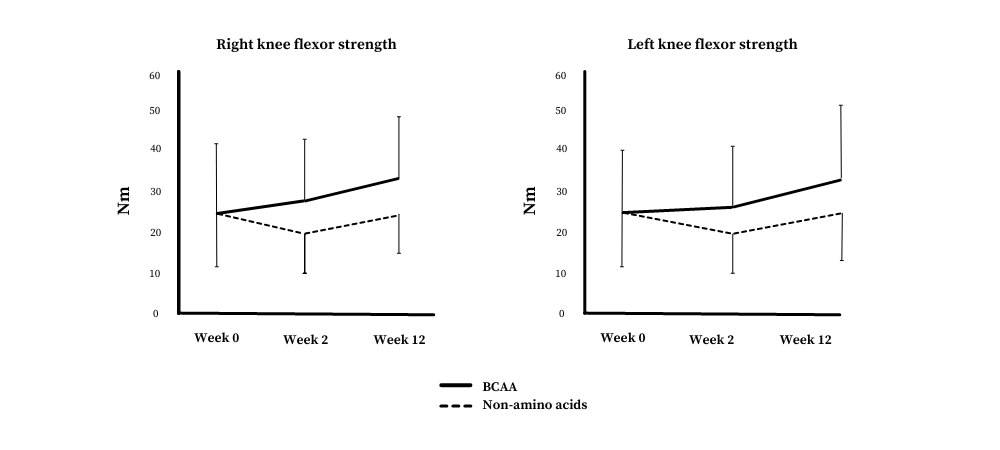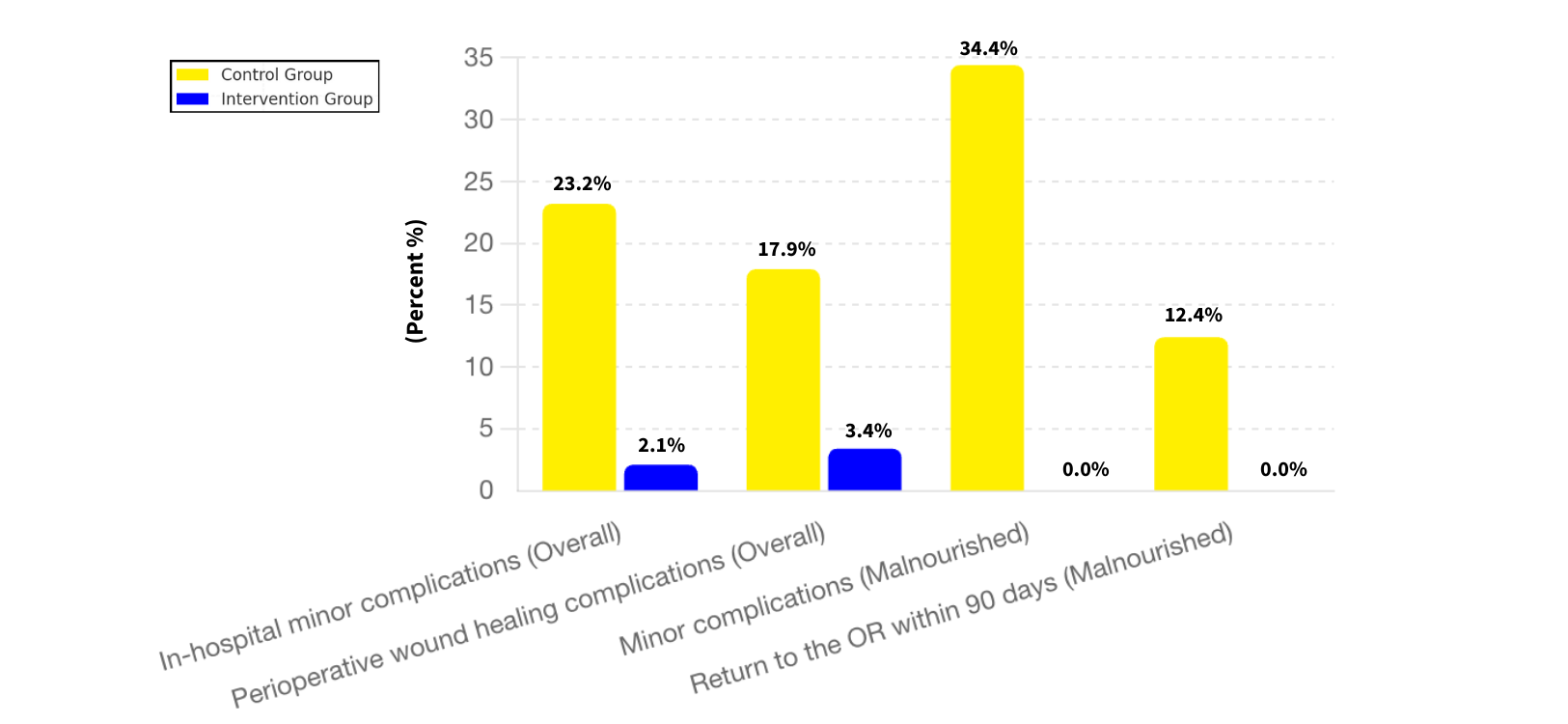
Spine Studies
XR is currently conducting pilot studies in evaluating the impact of targeted nutritional supplementation on posterior lumbar fusion outcomes, union rates and functional recovery.
Targeted nutritional supplementation (TNS) has been successfully used in multiple clinical settings. Enhanced outcomes have been seen for many years in burn, plastic, ulcer, and reconstructive surgery of head & neck cancer. The rationale for supplementing is based primarily on studies that show an increase in wound breaking strength and collagen formation in these challenging patient populations.
Similar concerns are seen with spine fusion patients in which a successful clinical outcome depends on adequate collagen synthesis to allow for wound / bone healing and graft incorporation.
Recent studies have also demonstrated TNS to improve post-op fusion rates and decreased complications in orthopedic trauma (1) and posterior spine fusion patients (2,3).
-

BCAAs plus vitamin D supplementation promote increased muscle strength following lumbar surgery
Patients who received supplementation twice daily for 3 weeks from the day after surgery showed:
*At 2 weeks postop, the nonamino acid group showed significant deterioration compared with the BCAA group for strengths of knee extensor and knee flexor (p < .01)
*At 12 weeks, the BCAA group showed significant improvements in knee extensor strength and knee flexor strength compared with the nonamino acid group (p <.01)
Spine Journal 2023
-

Protein Supplement and Enhanced Recovery After Posterior Spine Fusion
Patients who received a diet with 1.2 g of protein plus high-protein supplement (36 g whey protein) showed:
Significantly Higher Rate:
*Vertebral fusion
*Wound healing
*Increased serum:
*IGF-1, Albumin, total protein, Alk Phos
Significantly Lower:
*Surgical site infection
*Pain
*CRP
Clin Spine Surg. 2022
-

Effect of Protein Supplement on Paraspinal Muscles
Patients who received a diet with 1.2 g of protein plus high-protein supplement (36 g whey protein) showed:
Significantly Increased:
*CSAs of multifidus and psoas muscles
Decreased:
*Atrophy: erector spinae and quadratus lumborum muscles
*Pain
*Disability
Clin Spine Surg. 2021
-

Nutritional Supplementation Decreases Complications Following Lumbar Spine Surgery
Results:
(35.9%) were considered malnourished preoperatively
All Patients receiving supplementation had lower rates of:
*in-hospital minor complications (2.1% vs. 23.2%, P < 0.01),
*perioperative wound healing complications (3.4% vs. 17.9%, P < 0.05).
Subgroup analysis of 37 malnourished patients demonstrated that malnourished patients who received supplementation had lower rates of:
*minor complications during admission (0.0% vs. 34.4%, P=0.01)
*return to the operating room within 90 days (0.0% vs. 12.4%, P = 0.04).
Saleh SPINE 2022
Reported rates of nonunion following posterior spinal fusion range from 0-70%. Rates are variable due to the various operative techniques, underlying diagnoses as well as patient variables. Malnutrition, tobacco use, chronic oral anti-inflammatory use, multilevel fusion, prior spine surgery, and sagittal imbalance are all risk factors for spinal nonunion.
Nutritional status has been identified to be a strong predictor of surgical outcomes in orthopaedic trauma, total joint arthroplasty, spine, shoulder arthroplasty, rotator cuff repair as well as distal radius fractures.
Advances in nutritional supplementation can be implemented to support patients recovering from spinal procedures to aid in improving fusion rates and as well as mitigate post-op muscle loss aimed to accelerate functional recovery.
Collapsible content
References
1) Hendrickson NR, Davison J, Glass NA, Wilson ES, Miller A, Leary S, Lorentzen W, Karam MD, Hogue M, Marsh JL, Willey MC. Conditionally Essential Amino Acid Supplementation Reduces Postoperative Complications and Muscle Wasting After Fracture Fixation: A Randomized Controlled Trial. J Bone Joint Surg Am. 2022 May 4;104(9):759-766. doi: 10.2106/JBJS.21.01014. Epub 2022 Mar 14. PMID: 35286282.
2) Khalooeifard R, Oraee-Yazdani S, Keikhaee M, Shariatpanahi ZV. Protein Supplement and Enhanced Recovery After Posterior Spine Fusion Surgery: A Randomized, Double-blind, Placebo-controlled Trial. Clin Spine Surg. 2022 Apr 1;35(3):E356-E362. doi: 10.1097/BSD.0000000000001222. PMID: 34379607.
3) Khalooeifard R, Shariatpanahi ZV, Ahani A, Keykhaee M, Oraee-Yazdani M, Zali A, Oraee-Yazdani S. Effect of Protein Supplement on Paraspinal Muscles in Spine Fusion Surgery: A Randomized, Double-Blind, Placebo-Controlled Trial. Int J Spine Surg. 2021 Feb;15(1):47-54. doi: 10.14444/8005. Epub 2021 Feb 18. PMID: 33900956; PMCID: PMC7931746.
4) Minetama M, Kawakami M, Teraguchi M, et al. Branched-chain amino acids plus vitamin D supplementation promote increased muscle strength following lumbar surgery for lumbar spinal stenosis: a randomized trial.Spine J. 2023;23(7):962-972. doi:10.1016/j.spinee.2023.03.007




